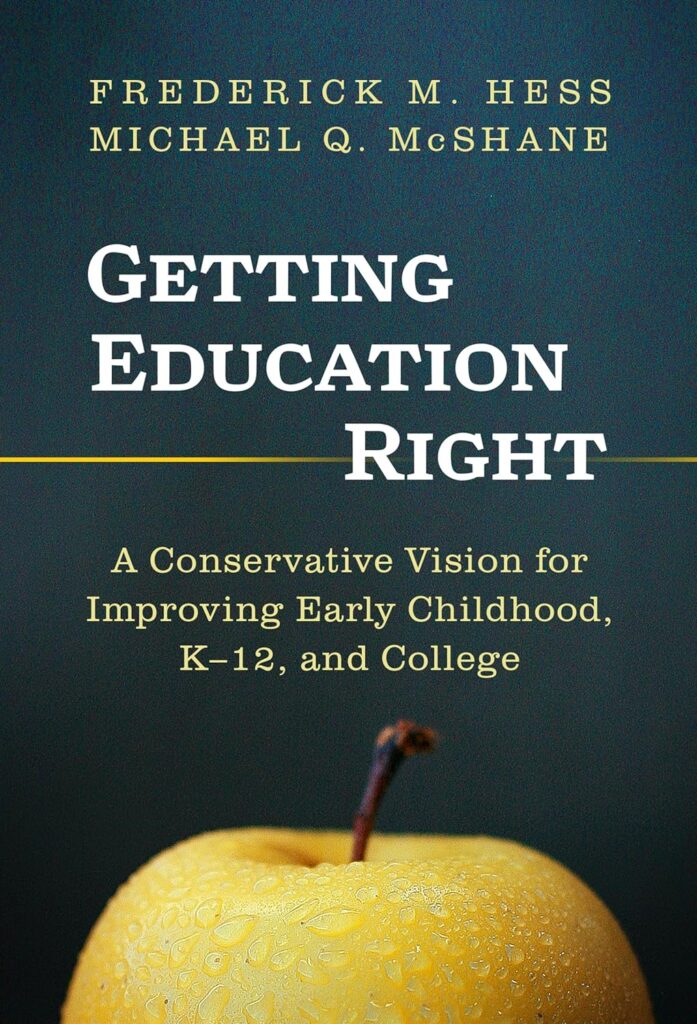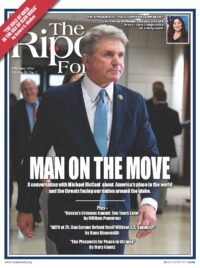 Chaotic campuses rife with double standards about the kinds of speech that merit protection. A Biden administration determined to let student borrowers shrug off hundreds of billions in loans and stick taxpayers with the tab. Progressive states working to eliminate advanced math based on misguided notions of “equity.” Survey findings showing that, when asked about the purpose of civics education, more K–12 teachers mention environmental activism than “knowledge of social, political, and civic institutions.”
Chaotic campuses rife with double standards about the kinds of speech that merit protection. A Biden administration determined to let student borrowers shrug off hundreds of billions in loans and stick taxpayers with the tab. Progressive states working to eliminate advanced math based on misguided notions of “equity.” Survey findings showing that, when asked about the purpose of civics education, more K–12 teachers mention environmental activism than “knowledge of social, political, and civic institutions.”
Tack on prolonged school closures, campus craziness, and declining test scores, and it’s no great surprise that public confidence in the nation’s schools and colleges has plunged. This plunge has shaken the public’s confidence in Democrats (long seen as the party of the teachers’ unions and the faculty lounge). But it also gives the GOP a historic opportunity to lead on education. Unburdened by longstanding relationships with the education blob, conservatives are well-positioned to stand up for common sense, shared values, and much-needed rethinking.
Yet, while Democrats have fumbled their longtime lead on education, Republicans haven’t yet seized the baton. Indeed, other than school choice, it can seem like the right doesn’t have many actionable ideas — with most of its energy consumed combating the left’s worst ideas. It can be far from clear what Republicans are actually for when it comes to education.
While Democrats have fumbled their longtime lead on education, Republicans haven’t yet seized the baton. Indeed, other than school choice, it can seem like the right doesn’t have many actionable ideas.
This impression, though, is the product of performative politics and clickbait controversies. The reality, as we explore in our new book, Getting Education Right, is that conservatives have a raft of practical solutions to the kitchen-table concerns of American families.
 Now, the place to start is by talking values — not wonkery. While many traditional conservatives can shy away from talk about values, this is unwise. Schools and colleges are formative, cultural institutions. You wouldn’t know it from reading the New York Times, but public sentiment leans sharply right on education’s big cultural debates. In getting on the wrong side of a bunch of 70-30 issues, Democrats have created remarkable opportunities for the right. That entails empowering parents, embracing notions like merit and hard work, and insisting that college should be about learning rather than performative politics.
Now, the place to start is by talking values — not wonkery. While many traditional conservatives can shy away from talk about values, this is unwise. Schools and colleges are formative, cultural institutions. You wouldn’t know it from reading the New York Times, but public sentiment leans sharply right on education’s big cultural debates. In getting on the wrong side of a bunch of 70-30 issues, Democrats have created remarkable opportunities for the right. That entails empowering parents, embracing notions like merit and hard work, and insisting that college should be about learning rather than performative politics.
While the KIPP charter schools may have retired their motto “Work Hard, Be Nice” as a legacy of white supremacy culture, more than 80 percent of parents say they want their kids to work hard and be nice. Three-quarters of voters think it important that students learn the “traditional values of Western civilization” and more than 90 percent that they learn “how the Declaration of Independence and the Constitution advanced freedom and equality.” Seventy percent of adults (and 55 percent of Democrats!) don’t believe that race should factor into college admissions and over two-thirds think students should play on sports teams that reflect their biological sex.
Leading with values allows conservatives to defend common sense, sketch out common ground, and anchor policy in shared principles. Here, we’ll touch on a few key places conservatives should start.
Early childhood. Strengthening and supporting families should be front and center in any conservative education agenda. American families are struggling to find reliable, affordable early childhood options. Democrats have responded by embracing the approach of Bill de Blasio’s New York, which consisted of effectively tacking a couple extra grades onto the front end of the city’s dysfunctional, unionized public school system. This meant embracing a K-12 calendar, moving little kids into big school buildings, and disrupting mom-and-pop and church-sponsored offerings. This isn’t good enough. Families want options that are less institutional, more flexible, closer to their employers, and open year-round. Virginia Governor Glenn Youngkin has offered a different way forward. His new early childhood initiative cuts red tape, creates a virtual “Navigator” to help families find early childhood options, provides parents with a virtual wallet that aggregates public and private subsidies, and partners with employers and colleges to find physical space and expand offerings.
Conservatives must offer a better way. There’s a need for adults who will unflinchingly fight for classroom discipline, rigor, parental responsibility, accountable schools, and good options for high-achievers as well as struggling students.
College costs. The cost of college keeps going up, and students and taxpayers are less and less confident in the return on investment. Democrats have responded with “free college” plans and calls to “forgive” student loans, turning a blind eye to root causes. There are better ways forward. On Capitol Hill, Republicans have proposed requiring colleges that accept federal student loans to put some skin in the game, holding them accountable for a chunk of the cost if borrowers don’t make taxpayers whole. Former Maryland governor Larry Hogan (in an increasingly imitated move) mandated that state agencies hire based on skills and experience rather than credentials, reducing the pressure to chase unnecessary degrees. Especially given sharp reductions in full-time student workloads over time, legislators should push public colleges to develop three-year degree options that will expedite degree completion and reduce costs.
K–12 excellence. Educational choice is good and important. But it can’t be the only thing conservatives offer on K–12. After all, the left has turned a potentially healthy concern for “equity” to morph into a caricature — with school discipline, rigorous grading, homework, attendance policies, advanced instruction, and much else now dismissed as “inequitable.” Conservatives must offer a better way. There’s a need for adults who will unflinchingly fight for classroom discipline, rigor, parental responsibility, accountable schools, and good options for high-achievers as well as struggling students. Regardless of their race or ethnicity, no student is well-served by chaotic schools, grade inflation, or low expectations. We need to say that, over and over. Not only should it be easy to defend these things, but it offers a terrific opportunity to find common ground with beleaguered educators.
There’s far more that needs doing, of course. There are opportunities to thoughtfully boost teacher pay, tackle college groupthink, expand career and technical education, tackle the use (and abuse) of smartphones and AI, strengthen civics, and much else. But these three pillars offer an auspicious, ambitious place to start.
Frederick M. Hess is director of education policy studies at the American Enterprise Institute. Michael McShane is director of research at EdChoice. They are the authors of the new book Getting Education Right: A Conservative Vision for Improving Early Childhood, K–12, and College.




